Table of Contents
Stablecoins are a cornerstone of on-chain activity, acting as the primary medium of exchange and a reliable store of value. Yet, swapping between them, for instance from USDC to USDT, or bridging assets across different networks, can be inefficient and expensive. Slippage, network fees, and fragmented liquidity across thousands of pools can quickly erode your capital, turning what should be a simple 1:1 swap into a loss. This is the exact problem that stablecoin aggregators are designed to solve.
These powerful platforms function as smart routers, scanning hundreds of decentralized exchanges (DEXs), liquidity sources, and cross-chain bridges in real time. Their goal is to find the single most efficient path for your trade, guaranteeing the best possible execution price while minimizing costs. To fully grasp their role, it's crucial to first understand what Decentralized Finance (DeFi) entails, as these tools are fundamental to navigating its complex ecosystem.
This comprehensive guide will break down the top stablecoin aggregators available today. We move beyond simple descriptions to provide an in-depth analysis of their routing mechanics, security audits, fee structures, and ideal use cases. You will find hands-on tips, screenshots, and direct links for each platform, helping you compare them effectively. Whether you are a high-frequency trader seeking minimal slippage, a developer integrating swaps into a dApp, or an institution managing a treasury, this resource is built to help you select the perfect aggregator for your specific needs and optimize every single on-chain transaction.
1. 1inch: The Veteran Powerhouse for Multi-Chain Routing
Website: 1inch.io
As one of DeFi's most established DEX aggregators, 1inch offers a robust and battle-tested platform for executing stablecoin swaps with deep liquidity. While not exclusively a stablecoin aggregator, its powerful routing algorithm, Pathfinder, excels at finding the most efficient swap paths for assets like USDC, USDT, and DAI across dozens of liquidity sources on multiple EVM-compatible chains.
What sets 1inch apart for stablecoin users is its Fusion mode. This feature allows for gasless, MEV-protected swaps by having professional resolvers cover the gas fees in exchange for a portion of the trade's surplus. For stablecoin swaps, where margins are thin, this protection against front-running and sandwich attacks is a significant advantage, ensuring the quoted price is what you get.
Key Features & Use Cases
- Pathfinder Algorithm: Scans liquidity from major DEXs like Uniswap, Curve, and Balancer to find optimal rates, often splitting trades across multiple pools to minimize slippage.
- Fusion Mode: Ideal for users who want to avoid unpredictable gas fees and MEV exploitation. You simply sign a transaction, and a resolver executes it on-chain for you.
- Limit Orders: Set specific price points for your stablecoin swaps, which are executed automatically without requiring constant monitoring.
- Cross-Chain Support: Seamlessly swap stablecoins across networks like Ethereum, Polygon, and BNB Chain using the 1inch Bridge aggregator.
While the interface can feel complex for absolute beginners, its power is undeniable for traders seeking the best possible execution. For those looking for one of the top stablecoin aggregators with a proven track record and advanced trading features, 1inch remains a premier choice.
2. Matcha: Sleek, Transparent Stablecoin Swapping
Website: matcha.xyz
Powered by the 0x protocol, Matcha offers one of the cleanest and most user-friendly interfaces for sourcing liquidity. It excels at making complex DEX aggregation simple, making it an excellent choice for users who prioritize transparency and ease of use for their stablecoin swaps. Matcha pulls liquidity from a wide array of sources across major EVM chains, presenting clear price breakdowns and fee structures.
What makes Matcha a strong contender among the top stablecoin aggregators is its commitment to a polished user experience. It clearly displays the net output you will receive after all fees and potential slippage, removing the guesswork often associated with DeFi swaps. Its smart order routing is highly reliable, leading to a reputation for having a very low rate of failed transactions, which is crucial when dealing with stablecoin trades where every basis point matters.
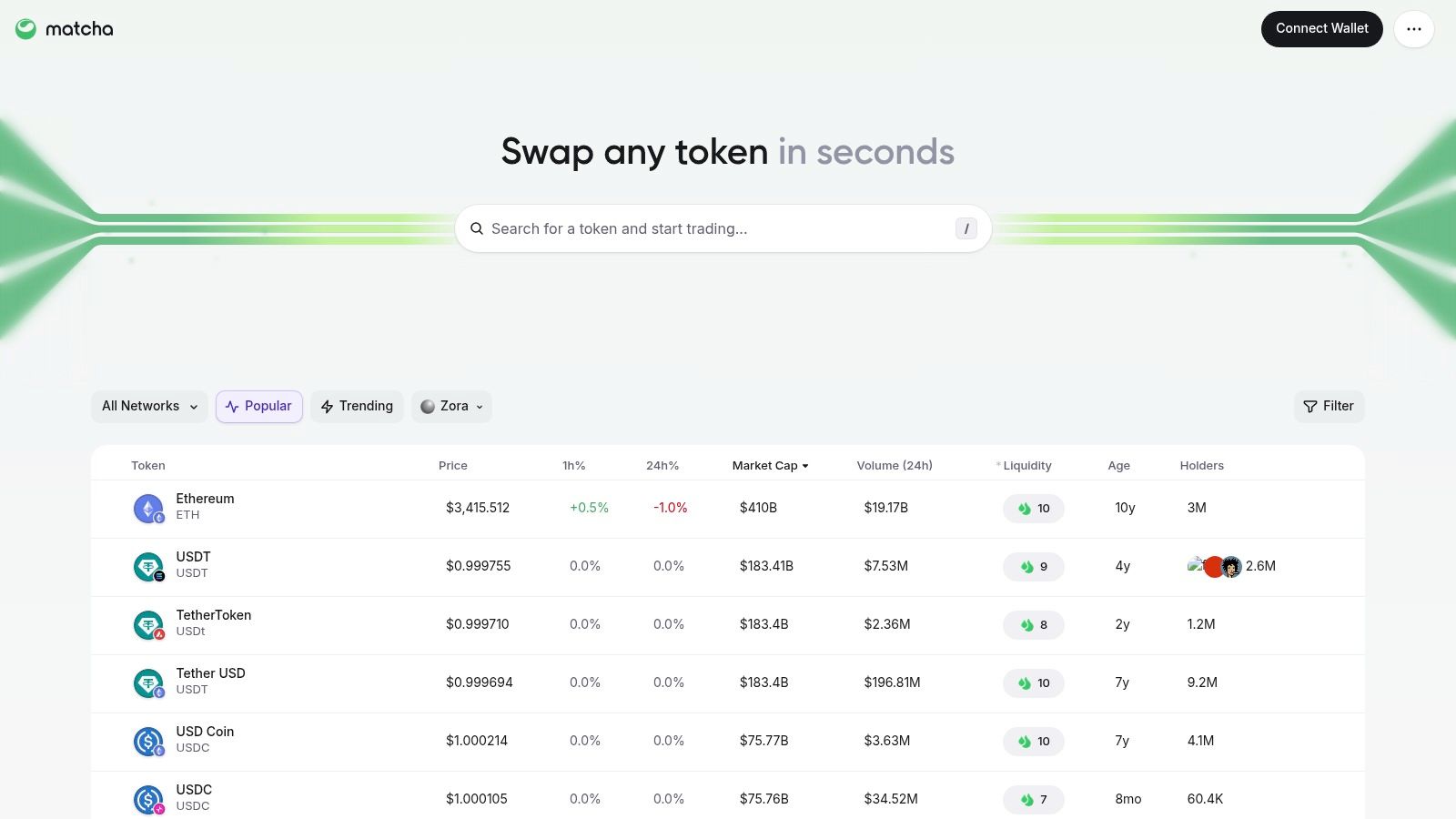
Key Features & Use Cases
- 0x API Power: Leverages the battle-tested 0x API for smart order routing, tapping into dozens of liquidity sources to find competitive rates for pairs like USDC/DAI.
- Transparent Quoting: The interface explicitly shows the network fee, Matcha fee (if applicable), and the final price, so there are no surprises.
- Limit Orders: Allows users to set target prices for their stablecoin trades, which execute automatically once the market rate is met.
- Multi-Chain Search: A unified search bar lets you find and trade stablecoins across supported networks like Ethereum, Polygon, and Avalanche without switching UIs.
While Matcha may lack some of the advanced, configurable MEV protection or automated cross-chain features found in more specialized platforms, its focus on transparent, reliable execution makes it a go-to for both newcomers and seasoned DeFi users looking for a straightforward swapping experience.
3. ParaSwap: Pro-Grade Aggregation with RFQ Liquidity
Website: paraswap.app
ParaSwap is a high-performance DEX aggregator that combines on-chain liquidity with an off-chain Request-for-Quote (RFQ) system, making it a powerful contender among the top stablecoin aggregators, especially for larger trades. Its engine sources rates from over 160 protocols and directly from professional market makers, who compete to offer tighter spreads and zero-slippage quotes.
What distinguishes ParaSwap is this hybrid approach. While its algorithm finds efficient paths through standard AMMs, the integration of private liquidity from market makers often results in superior execution for stablecoin swaps where even small price improvements matter. This makes it a go-to platform for traders and DeFi protocols that prioritize capital efficiency and deep liquidity access. Note that access from the US may be restricted on some interfaces.
Key Features & Use Cases
- Hybrid Liquidity: Combines public liquidity pools with a private RFQ system, allowing users to tap into exclusive quotes from professional market makers for better pricing.
- Delta Mode: A gas-abstracted execution model similar to 1inch's Fusion, designed to minimize MEV risk by having third-party executors (Partners) handle the on-chain submission.
- Developer-Friendly APIs: ParaSwap is widely integrated into wallets and dApps, offering robust APIs for developers needing reliable swap functionality for their users.
- Cross-Chain Swaps: Facilitates stablecoin swaps across multiple networks, aggregating not only DEXs but also bridge solutions to find optimal cross-chain routes.
ParaSwap's architecture is built for performance, offering a distinct advantage for those executing significant stablecoin volume. While you still pay the underlying gas and protocol fees, its ability to source quotes directly from market makers solidifies its position as a top-tier aggregator.
4. KyberSwap: The All-in-One Aggregator and Liquidity Hub
Website: kyberswap.com
KyberSwap offers a unique blend of a powerful multi-chain aggregator and its own native concentrated liquidity pools. This dual functionality means it not only scans external DEXs for the best stablecoin rates but also leverages its own efficient KyberSwap Elastic pools, often resulting in highly competitive execution. It has established itself as a versatile platform supporting a wide array of EVM chains.
For stablecoin traders, this integrated approach provides access to deep, capital-efficient liquidity. The platform's commitment to user experience is evident through its clean interface, which includes advanced analytics and safety advisories directly within the swap UI, helping users make more informed decisions.
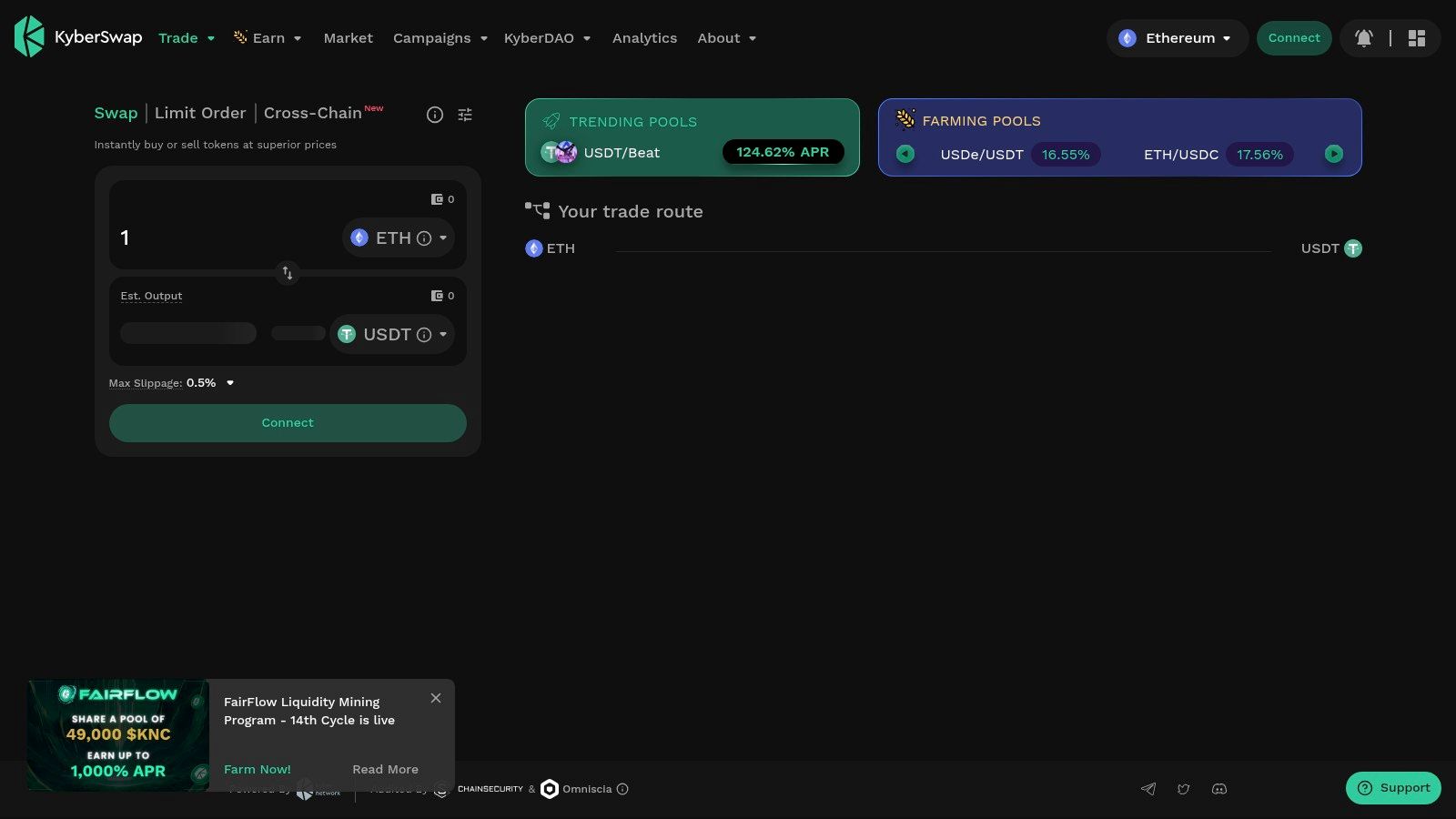
Key Features & Use Cases
- Hybrid Aggregation: Combines routes from over 80 DEXs with its own concentrated liquidity protocol, KyberSwap Elastic, for superior price discovery.
- Discover Feature: Provides on-chain trend analysis, highlighting potentially trending tokens to help traders identify opportunities directly on the platform.
- Limit Orders: Allows users to set target prices for stablecoin swaps, which execute automatically, removing the need for constant market monitoring.
- Broad Chain Support: Available on numerous networks, including Ethereum, Polygon, Arbitrum, and Avalanche, with US-accessible front-ends available for compliance.
While KyberSwap provides a comprehensive ecosystem for swapping and earning, users should be cautious and always verify they are on the official domain, as the platform's popularity has attracted phishing attempts. For those seeking one of the top stablecoin aggregators that integrates trading, earning, and analytics into a single interface, KyberSwap is an excellent and feature-rich choice.
5. CoW Swap: The MEV-Resistant Batch Auction Aggregator
Website: swap.cow.fi
CoW Swap offers a fundamentally different approach to aggregation, making it one of the top stablecoin aggregators for security-conscious traders. Instead of routing transactions directly on-chain, it collects user intents (e.g., "I want to swap 10,000 USDC for DAI") and settles them in batches. This unique batch auction model protects users from MEV threats like sandwich attacks, a critical benefit when swapping large stablecoin amounts.
Professional "solvers" compete to find the best possible execution path for the entire batch, which can include direct peer-to-peer matches (a "coincidence of wants"), tapping into on-chain liquidity, or a combination of both. This competition ensures users receive the best net price after fees and slippage.

Key Features & Use Cases
- Batch Auctions & Solvers: All trades in a block are bundled and settled together. Solvers compete to provide the best price, protecting you from front-running and maximizing your return.
- Gasless Trading Model: Users sign an off-chain intent, and the winning solver pays the gas fee for settlement, abstracting away network fee management. The cost is simply built into the final quote.
- Peer-to-Peer Settlement: If your trade can be matched directly with another user's in the batch, CoW Swap facilitates a P2P swap, bypassing AMM fees and slippage entirely.
- Uniform Clearing Prices: Everyone swapping the same pair within a batch receives the same final price, preventing individual orders from getting picked off by MEV bots.
While the settlement process can sometimes take slightly longer than a direct DEX swap, the powerful MEV protection and potential for superior pricing on larger trades make CoW Swap a standout choice. The platform is ideal for users prioritizing final execution price and security over instant settlement.
6. Odos: The Smart Router for Complex Swaps
Website: odos.xyz
Odos distinguishes itself with an exceptionally powerful pathfinding algorithm that explores a vast, non-linear universe of potential swap routes. While many aggregators find simple A-to-B paths, Odos analyzes complex, multi-step routes involving intermediate tokens to uncover superior pricing, a feature that makes it one of the top stablecoin aggregators for minimizing slippage on large trades.
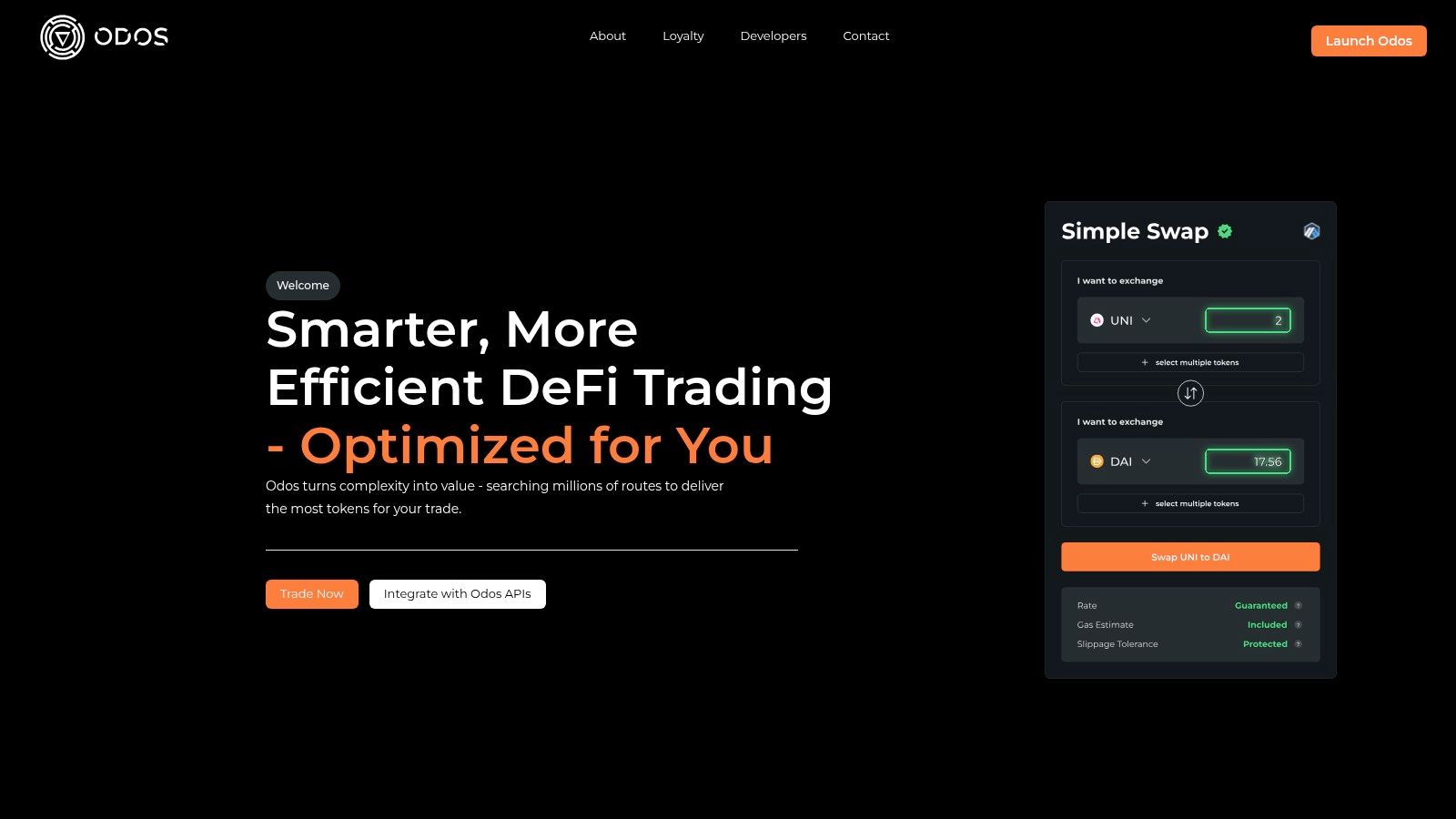
The platform's standout feature is its multi-token input capability. This allows users to consolidate multiple different assets, including various stablecoins or volatile tokens, into a single target stablecoin in one atomic transaction. This is incredibly efficient for rebalancing a portfolio, saving significant gas fees and time compared to executing individual swaps for each asset. The clean, visual breakdown of the chosen route also provides unparalleled transparency into how Odos achieves its execution.
Key Features & Use Cases
- Advanced Pathfinding: Its proprietary algorithm identifies complex routes that often yield better rates than direct swaps, especially for less common stablecoin pairs.
- Multi-Asset Swaps: A game-changer for portfolio management, allowing users to swap up to six different input tokens into one output token simultaneously.
- Visual Route Breakdown: The interface graphically displays the exact path of your swap, showing which DEXs and intermediate assets are used, which builds user trust.
- Developer-Friendly: With comprehensive public documentation, Odos is also a strong choice for developers looking to integrate a sophisticated swap router into their dApps.
While it may be newer than some legacy players, Odos’s innovative approach to routing and unique multi-asset functionality provide a clear advantage for DeFi users seeking maximum capital efficiency.
7. OpenOcean: The Cross-Chain Navigator for Maximum Reach
Website: openocean.finance
OpenOcean positions itself as a comprehensive aggregator not just for liquidity but for chains themselves, supporting an impressive roster of over 40 networks, including both EVM and non-EVM ecosystems. For stablecoin users, this translates into unparalleled access, enabling swaps between niche stablecoins on emerging chains and major assets like USDC or USDT on established networks, all from a single interface.
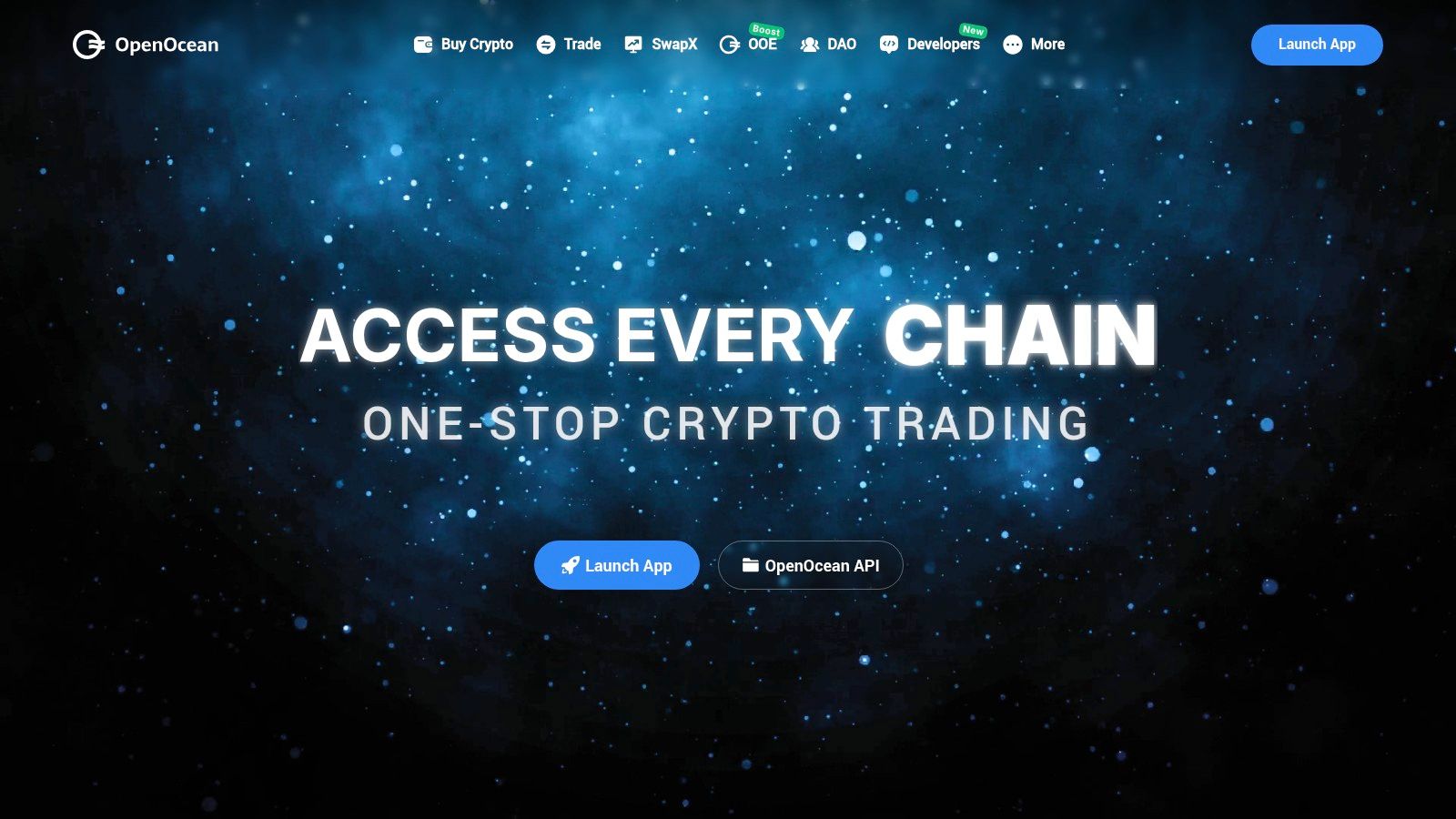
What makes OpenOcean a powerful tool among the top stablecoin aggregators is its intelligent routing algorithm combined with a suite of advanced trading tools. It doesn't just find a good price; it offers tools like limit orders and Dollar-Cost Averaging (DCA) to execute your stablecoin strategy with precision. This makes it ideal for users who need to bridge stablecoin liquidity across disparate blockchain environments without manually navigating multiple bridges and DEXs. For a deeper dive, our full OpenOcean review explores its cross-chain capabilities.
Key Features & Use Cases
- Extensive Chain Support: Aggregates liquidity from over 40 chains, making it a go-to for swapping stablecoins on less common networks like Solana, Avalanche, and Fantom.
- Advanced Order Types: Set specific price targets for stablecoin swaps with limit orders or automate periodic purchases using its native DCA feature.
- Gas Price Presets: Offers multiple transaction speed options (slow, standard, fast) to help users balance cost and confirmation time effectively.
- Developer-Friendly API: Provides a robust API for dApps and trading bots to integrate OpenOcean’s superior routing for their own stablecoin swap functionalities.
While the sheer number of options can sometimes result in variable route quality, OpenOcean's broad reach and built-in trading tools make it an indispensable asset for multi-chain stablecoin traders and developers.
8. Jupiter: Solana's Premier Aggregation Engine
Website: jup.ag
As the undisputed king of aggregation on the Solana network, Jupiter is the default destination for anyone looking to swap stablecoins within its ecosystem. It provides the most comprehensive liquidity routing, connecting users to a vast network of Solana-based DEXs like Orca and Raydium. Its primary function is to find the absolute best rate for any given trade, a critical task for stablecoin swaps where even small price differences matter.
Jupiter's dedication to the Solana ecosystem makes it one of the top stablecoin aggregators for users on that chain. The platform’s infrastructure is built to leverage Solana's high speed and low transaction costs, resulting in near-instantaneous and cheap stablecoin swaps. The interface is clean and user-friendly, a welcome contrast to some of the more complex multi-chain aggregators.
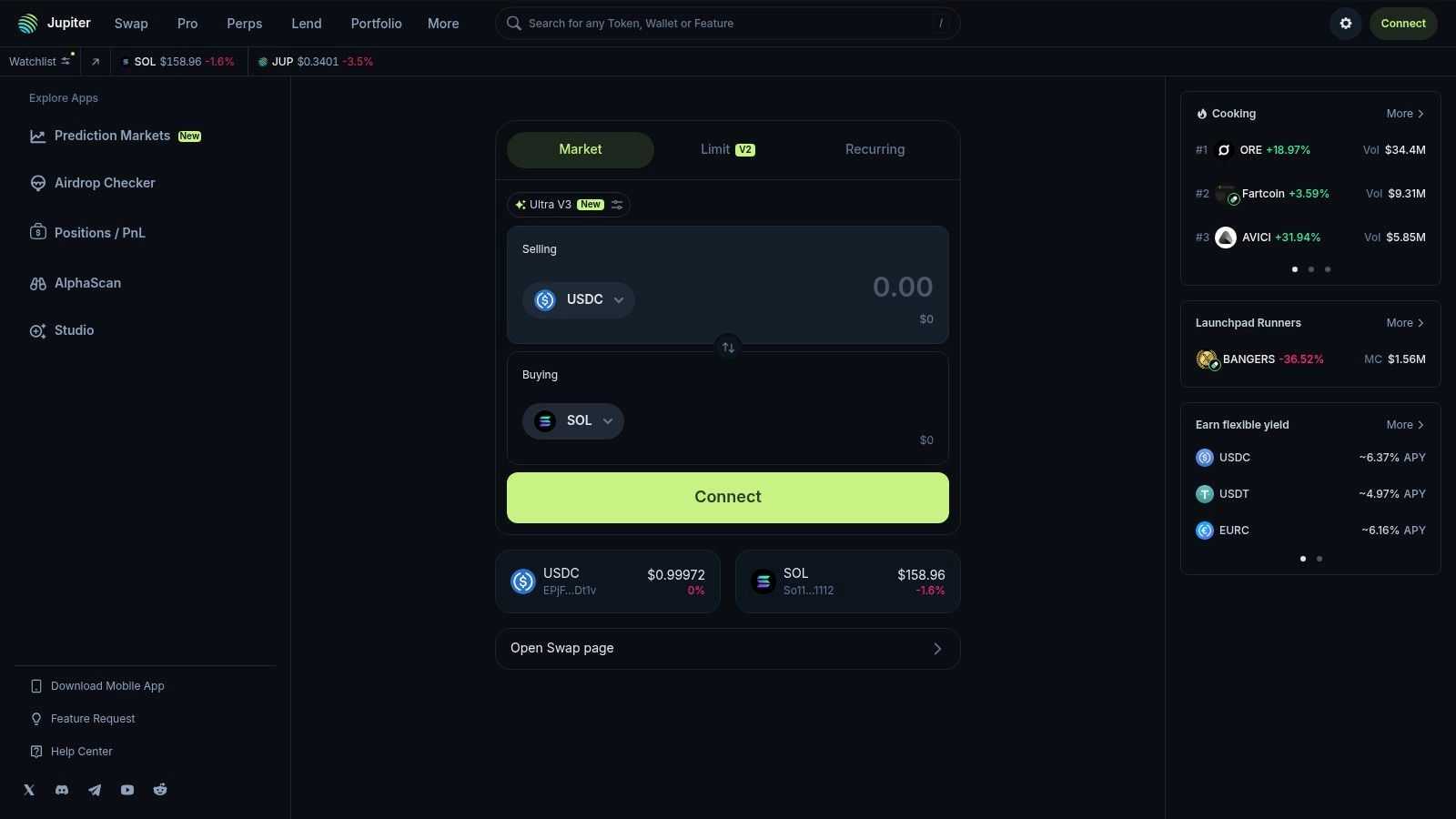
Key Features & Use Cases
- Best-Route Aggregation: Jupiter’s core technology intelligently splits trades across multiple Solana liquidity pools to guarantee the best price and minimize slippage.
- Limit Orders & DCA: Users can set specific price targets for their stablecoin trades or implement dollar-cost averaging (DCA) strategies directly through the platform.
- Perpetuals Trading: Beyond simple swaps, Jupiter offers a decentralized perpetuals exchange for more advanced trading strategies involving stablecoins.
- Extensive Documentation: The platform is supported by a robust knowledge base and active support channels, making it accessible for both new and experienced users.
While Jupiter offers an exceptional on-chain experience, users should be vigilant about phishing attempts and always verify the official domain (jup.ag). For anyone transacting primarily on Solana, Jupiter is not just an option; it's an essential tool for efficient and cost-effective stablecoin management.
9. LI.FI: The Go-To Aggregator for Cross-Chain Integrations
Website: li.fi
LI.FI positions itself less as a direct-to-consumer platform and more as the essential middleware powering cross-chain stablecoin swaps within other applications. It functions as an "any-to-any" swap aggregator, combining dozens of bridges and DEX aggregators to find optimal routes for moving assets like USDC and USDT between over 20 different blockchains.
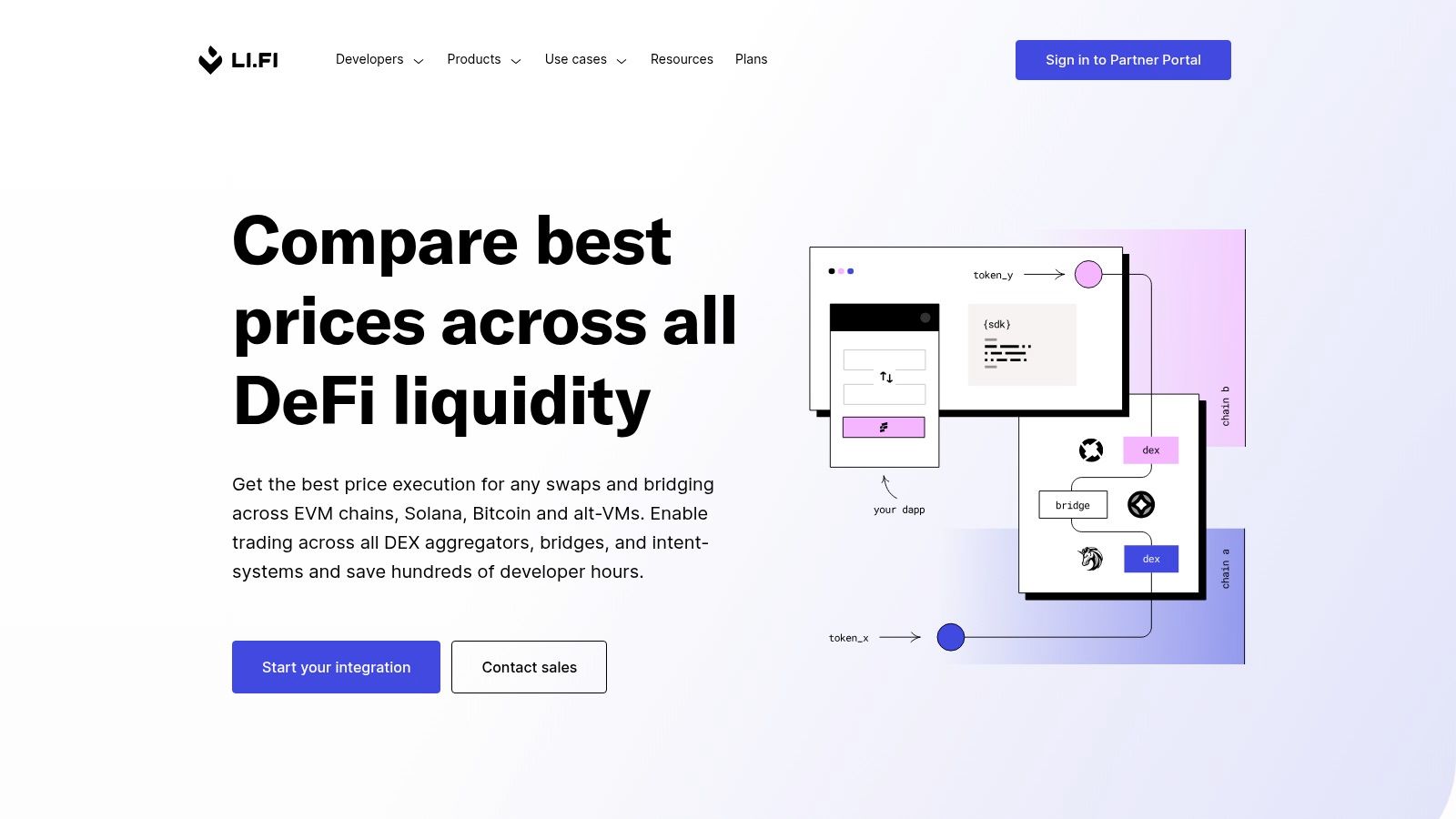
What makes LI.FI stand out is its developer-first approach. Through its powerful SDK and easily embeddable widget, it allows wallets, dApps, and DeFi protocols to integrate sophisticated cross-chain functionality directly into their user interface. This means users often interact with LI.FI's technology without ever leaving their favorite app, making it one of the top stablecoin aggregators for seamless, embedded experiences. For a detailed guide on its application, you can read more about how to transfer stablecoins across blockchains.
Key Features & Use Cases
- Bridge & DEX Aggregation: Combines multiple bridges (like Hop and Stargate) and DEXs (like 1inch) in a single route to ensure capital efficiency and connectivity.
- Developer-Focused SDK/Widget: Offers a highly configurable, open-source solution for projects to embed cross-chain swaps. Integrators can customize themes and allow/deny specific routes.
- Smart Routing: The algorithm considers fees, speed, and security to recommend the best path for a user's specific cross-chain stablecoin transfer needs.
- Enterprise Tooling: Provides robust documentation and support, making it a reliable choice for professional teams building multi-chain applications.
While the end-user experience depends heavily on the integrating application, LI.FI is the underlying engine for many of DeFi's most powerful cross-chain stablecoin flows, prioritizing flexibility and developer control above all else.
10. Bungee (by Socket): The User-Friendly Cross-Chain Navigator
Website: bungee.exchange
Bungee, powered by the Socket liquidity infrastructure, excels at simplifying cross-chain stablecoin swaps with an intuitive, "Google Maps-like" user experience. While many aggregators focus on single-chain swaps, Bungee is purpose-built to find the most efficient routes for moving assets like USDC and USDT between disparate networks, from Polygon to Arbitrum. It abstracts away the complexity of dealing with multiple bridges and DEXs into a single, seamless transaction.
What makes Bungee stand out among top stablecoin aggregators is its user-centric design and powerful developer tools. Its "Auto" mode automatically selects the best route based on speed, cost, and security, while its widely-used widget and SDK allow hundreds of dApps and wallets to embed its cross-chain functionality directly. This focus on both end-user simplicity and developer integration has made it a go-to solution for multi-chain navigation.

Key Features & Use Cases
- Optimized Cross-Chain Routing: Compares various bridges (like Stargate and Celer) and DEXs to recommend the optimal path for moving stablecoins between chains.
- Refuel Feature: A key offering that allows users to receive a small amount of the destination chain's native gas token along with their swap, preventing them from getting stranded without funds for transaction fees.
- Embeddable Widget & SDK: Developers can easily integrate Bungee's powerful cross-chain swapping capabilities into their own applications, a major reason for its widespread adoption.
- Security-First Approach: Bungee helps users assess the trade-offs of different bridging solutions, providing visibility into the risks associated with each route. For a deeper analysis, you can review this guide on stablecoin bridging risks and user experience.
While users should be aware of a past exploit on a third-party contract connected to Socket and revoke any legacy approvals, Bungee's commitment to simplifying the often-treacherous cross-chain landscape makes it an indispensable tool for DeFi natives and developers alike.
11. Symbiosis: The 'Any-to-Any' Cross-Chain Specialist
Website: symbiosis.finance
Symbiosis carves out its niche by focusing on "any-to-any" cross-chain swaps, making it an excellent tool for moving stablecoin value between disparate blockchain ecosystems. It uniquely combines DEX aggregation on both the source and destination chains with an integrated bridging protocol, allowing users to execute complex swaps like swapping ETH on Ethereum directly to USDC on Avalanche in a single transaction.
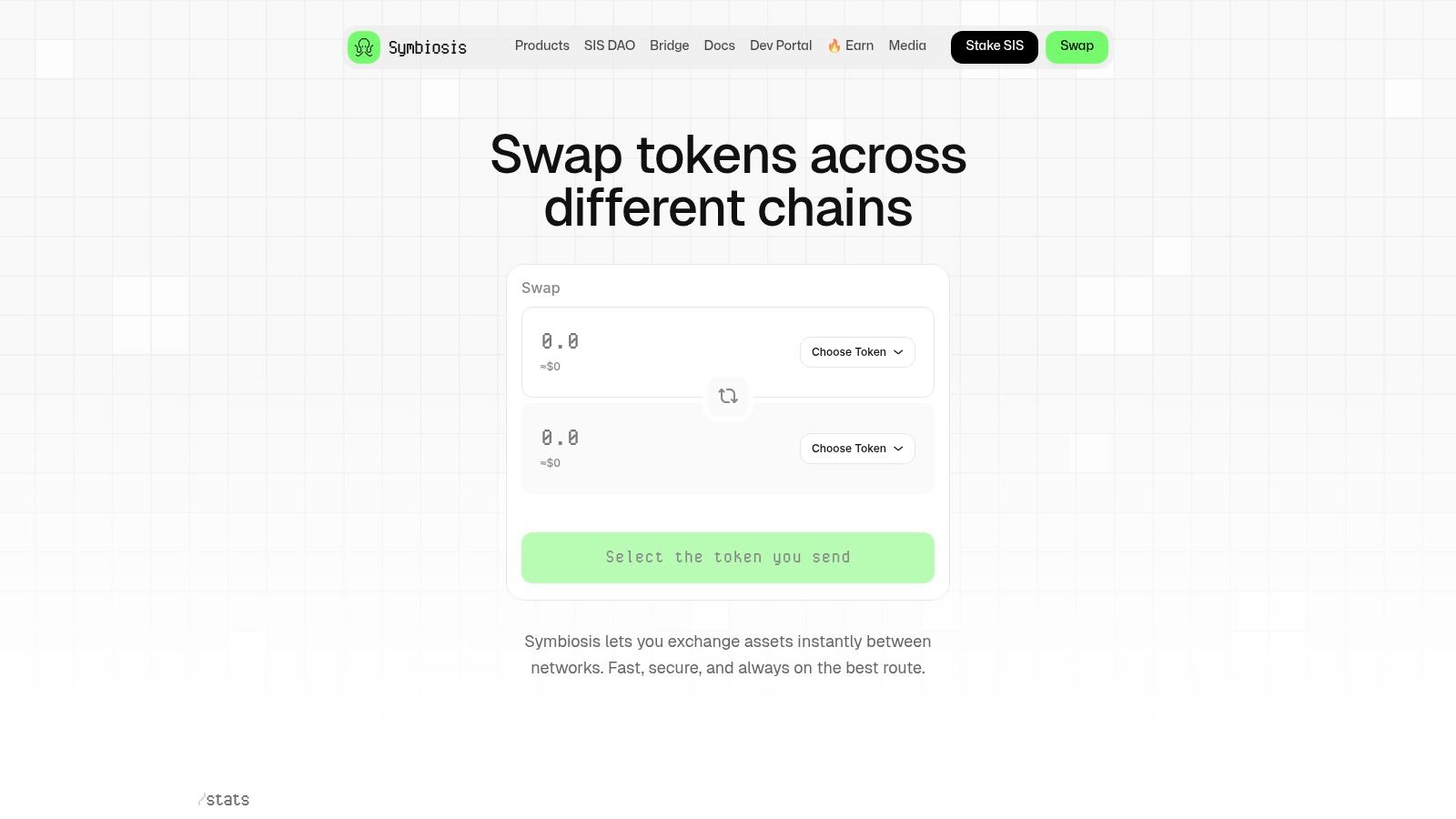
What makes Symbiosis a standout among top stablecoin aggregators is its seamless user experience for multi-chain asset movements. Instead of manually bridging assets and then swapping, Symbiosis abstracts this complexity away. The platform automatically finds the most efficient route, which might involve swapping into a wrapped asset, bridging, and then swapping again to the final desired stablecoin, all behind a simple and intuitive interface. This makes it ideal for users who prioritize convenience when navigating the multi-chain landscape.
Key Features & Use Cases
- Integrated Cross-Chain Swaps: Combines DEX aggregation with its own cross-chain messaging protocol to facilitate swaps between a vast number of supported networks.
- Liquidity Zaps: Allows users to provide liquidity to pools on a destination chain using an asset from a source chain in one click.
- Broad Network Support: Connects a wide array of EVM and non-EVM compatible chains, simplifying access to stablecoins in various ecosystems.
- Dual-Wallet Connection: The interface supports connecting different wallet types for the source and destination chains simultaneously, a helpful feature for complex transfers.
While route times and costs can vary depending on the underlying bridge and network congestion, its focus on simplifying cross-chain complexity is a significant advantage. For a deeper analysis, explore our full review of Symbiosis Finance.
12. Rhino.fi: The Cross-Chain Stablecoin Bridge Specialist
Website: https://rhino.fi
Rhino.fi positions itself as a cross-chain "DeFi super-app," but its core strength lies in facilitating seamless stablecoin movement between disparate ecosystems. It excels at combining bridging and swapping into a single, user-friendly transaction, making it a go-to platform for users and developers needing to migrate assets like USDC or USDT from one network to another without multiple complex steps.
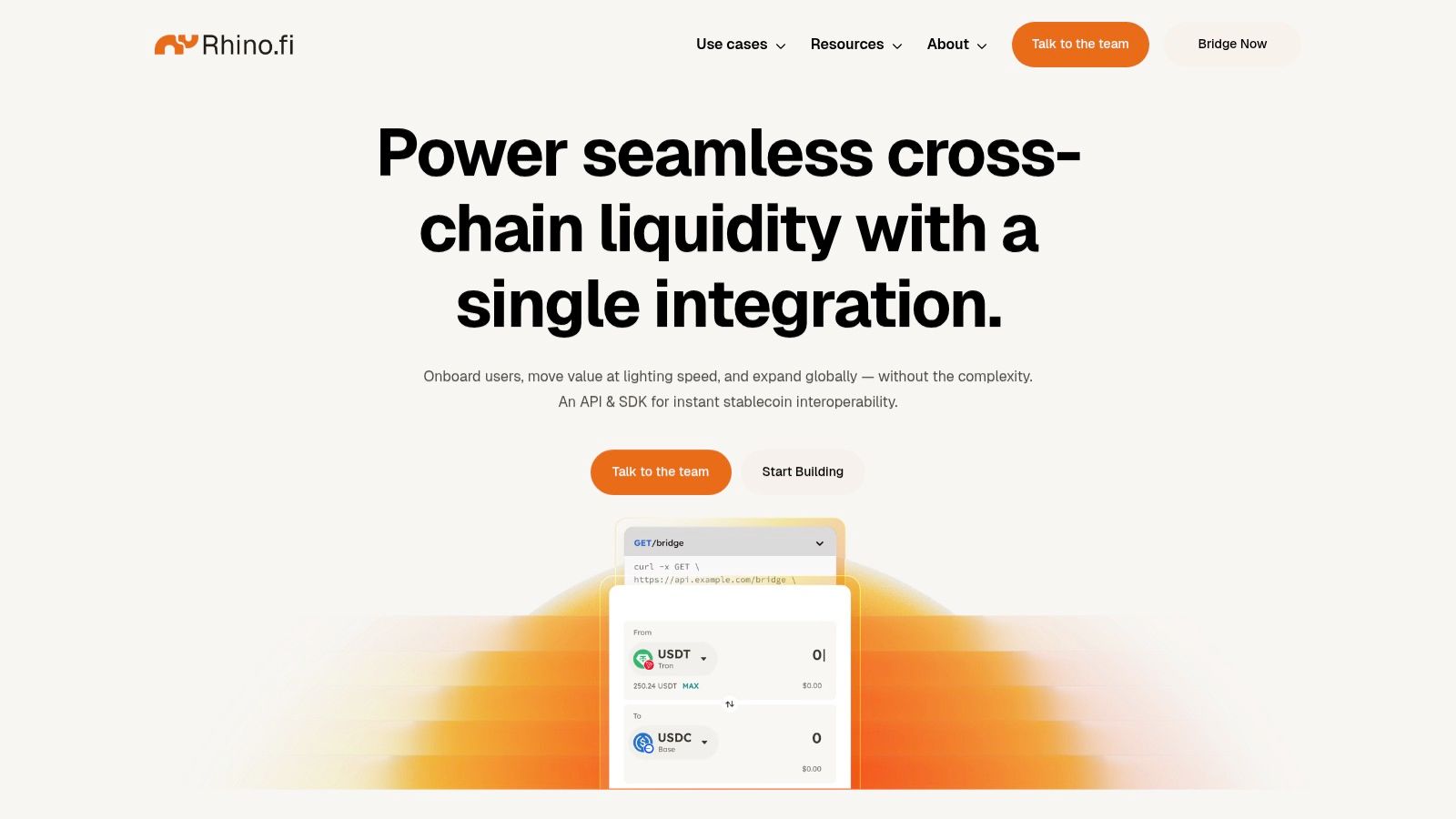
What makes Rhino.fi a standout among top stablecoin aggregators is its dual focus on both a clean user interface and robust developer tools. The platform offers a smart deposit address system that simplifies cross-chain flows, while its developer portal and APIs allow for programmatic stablecoin routing. This makes it a powerful tool not just for individuals, but also for businesses building cross-chain applications.
Key Features & Use Cases
- Bridge-and-Swap Flows: Execute multi-step cross-chain transfers in a single transaction, saving time and reducing potential user error.
- Smart Deposit Addresses: A simplified method for initiating stablecoin transfers across different blockchain environments.
- Developer Portal & APIs: Enables developers to programmatically integrate Rhino.fi's cross-chain routing into their own dApps and services.
- Multi-Ecosystem Support: Moves stablecoins across EVM chains and Layer-2 networks, with routes and liquidity constantly expanding.
While Rhino.fi may lack the advanced, trader-centric features of a pure DEX aggregator like limit orders, its specialized focus on simplifying cross-chain stablecoin logistics provides immense value. For anyone needing to efficiently bridge stable assets or integrate this functionality into a product, Rhino.fi offers a uniquely streamlined solution.
Top 12 Stablecoin Aggregators — Feature Comparison
| Service | Core features | UX & reliability | Best for / Value | Target audience | Risks & fees |
|---|---|---|---|---|---|
| 1inch | Multi-chain DEX aggregation; Fusion mode (intent-based, gasless, MEV protection); limit orders; cross-chain routing | Powerful route discovery; UI can be complex for new users | Tight net-price stablecoin routing across EVM chains; MEV-protected cross-chain swaps | Traders, power users, integrators | Route-dependent DEX/bridge/gas costs; cross-chain timing/latency; complex settings |
| Matcha by 0x | 0x smart order routing; transparent quotes/fees; limit orders; multi-chain token search | Polished, beginner-friendly UX; low failed-trade rate | Simple stablecoin swaps with clear fee breakdowns | Newcomers and casual traders | Fewer cross-chain automations; less advanced MEV shielding; standard gas fees |
| ParaSwap | Aggregation across 160+ protocols; on-chain RFQ market makers; cross-chain swaps; dev APIs | High-performance; strong developer tooling | Competitive on large stablecoin trades via RFQ liquidity | Traders, wallets, fintechs, developers | Fees vary by route/RFQ; pay underlying gas/DEX/bridge costs; some US access limits |
| KyberSwap | Multi-chain aggregation + concentrated-liquidity AMMs; analytics; earn tools; limit orders | Unified swap/earn/analytics UI; US-accessible frontends | One interface for swapping, earning and analytics | Retail users wanting analytics and yield options | Phishing/fake-site impersonation risk; verify official domains |
| CoW Swap | Batch auctions & solver competition; P2P settlement; uniform clearing price; off-chain intent matching | Good MEV protection; different flow with small learning curve | MEV-minimized execution and better prices on larger orders | Large traders and MEV-aware users | Settlement can be slower; route-dependent gas/fees |
| Odos | Advanced pathfinding; non-linear route exploration; multi-token inputs; visual route breakdowns | Transparent route visuals; newer platform with fewer reviews | Efficient multi-asset rebalances with minimal slippage | Power users and developers needing complex routing | Newer service; cross-chain support varies; route fees vary |
| OpenOcean | Aggregator across 40+ chains (EVM & non-EVM); limit orders, DCA, zaps; APIs & status dashboard | Feature-rich app; broad chain coverage; route quality variable by chain | Cross-chain stablecoin routing from a single UI with many tools | Multi-chain traders and integrators | Variable route quality; phishing domain risk; bridge/gas costs |
| Jupiter | Solana best-route aggregation; mobile apps and extension wallet support; docs | Fast, low-fee swaps on Solana; solid documentation; phishing risk exists | Default stablecoin router on Solana with deep liquidity | Solana users, app integrators, mobile users | Heavy phishing targeting; Solana congestion can affect partners |
| LI.FI | Widget/SDK aggregating bridges & DEXs; open-source; configurable allow/deny lists | Enterprise-friendly integrations; end-user UX depends on integrator | Embedded cross-chain stablecoin flows for wallets and dApps | Developers, wallets, enterprises | Middleware UX varies; route times and costs depend on chosen bridge |
| Bungee (by Socket) | Auto (agent) & Manual cross-chain modes; embeddable SDK; refuel options; visual routing UI | Straightforward one-step cross-chain swaps; good docs | Easy cross-chain stablecoin swaps with gas-refuel options | Wallets, dApps, end-users needing simple bridges | History of third-party approvals exploit (Socket) — revoke legacy approvals; route fees vary |
| Symbiosis | Any-to-any cross-chain swaps; liquidity zaps combining DEXs + bridges; multi-wallet flows | Simple cross-chain UI; good documentation | Land users in the target stablecoin across many chains | Multi-chain users and integrators | Route time/cost vary by bridge; liquidity depth varies by chain |
| Rhino.fi | Bridge-and-swap in a single transaction; smart deposit addresses; developer APIs | Stablecoin-focused UX and API tooling; interface evolving | Migrating USDC/USDT across ecosystems; programmatic transfers | Businesses, treasury teams, developers | Interface and routes evolving; fewer trader-focused features; route-dependent fees |
How to Choose the Right Stablecoin Aggregator for Your Needs
Navigating the landscape of DeFi can feel overwhelming, but as we've explored, the world of top stablecoin aggregators offers a powerful suite of tools designed to simplify and optimize your transactions. The key takeaway is that there is no single "best" aggregator; the optimal choice is entirely dependent on your specific goals, technical expertise, and risk tolerance. By moving beyond a one-size-fits-all mentality, you can unlock significant value in your stablecoin swaps.
From the expansive multi-chain support of LI.FI and Bungee to the MEV-resistant batch auctions of CoW Swap, each platform carves out a unique niche. Your journey to finding the right tool begins with a clear understanding of your own priorities. Are you a high-frequency trader needing the absolute lowest slippage, a developer integrating cross-chain swaps into a dApp, or a casual user simply looking for the most user-friendly interface for a one-off trade?
Matching the Tool to the Task
To make your decision process more concrete, let's categorize the aggregators we've discussed based on primary user needs. This framework will help you quickly narrow down the options and focus on the platforms that align with your strategy.
For Maximum Capital Efficiency & Deep Liquidity:
- 1inch and KyberSwap remain titans in this category, known for their sophisticated routing algorithms and access to vast liquidity pools on major EVM chains. They are ideal for large trades where minimizing price impact is the top priority.
- Odos is a powerful contender, with its unique tree-like pathfinding that often uncovers surprisingly efficient routes, making it a go-to for DeFi power users hunting for every basis point of value.
For Cross-Chain Native Swaps & Interoperability:
- LI.FI and Bungee (by Socket) are the clear leaders for developers and users needing to bridge and swap assets across different blockchain ecosystems. Their focus on connecting disparate chains through a single interface is invaluable for building multi-chain applications.
- Symbiosis offers a compelling alternative with its unique cross-chain Automated Market Maker (AMM) model, providing a streamlined experience for users who want to avoid the complexities of traditional bridges.
For MEV Protection & Fair Pricing:
- CoW Swap is in a class of its own with its "Coincidence of Wants" and batch auction model. If you are concerned about front-running or sandwich attacks, especially on the Ethereum mainnet, CoW Swap provides a robust defense mechanism.
- Rhino.fi also offers a unique value proposition by leveraging layer-2 technology to provide gasless swaps and instant finality, effectively sidestepping many of the MEV issues prevalent on Layer 1.
For User Experience & Accessibility:
- Matcha provides a polished and intuitive interface that is perfect for both new and experienced users. Its clean design abstracts away much of the underlying complexity.
- Jupiter is the undisputed king of the Solana ecosystem, offering an incredibly fast and user-friendly experience that has become the standard for traders on that network.
Final Considerations Before You Transact
Before you commit to a platform, remember to evaluate its security posture. Look for recent audits, bug bounty programs, and a transparent development team. Furthermore, consider the technological sophistication behind the scenes, including its pathfinding and MEV protection mechanisms. These often rely on complex algorithms, similar in principle to the broader field of algorithmic trading strategies, which aim to execute trades based on predefined rules to optimize outcomes.
The stablecoin economy is the bedrock of decentralized finance, and the aggregators we've covered are the essential gateways that make it efficient and accessible. By carefully selecting the right tool for your needs, you empower yourself to navigate this dynamic ecosystem with confidence, ensuring every swap is as secure and cost-effective as possible.
Stay ahead of the curve in the rapidly evolving world of stablecoins. For the latest research, data-driven analysis, and expert insights on everything from aggregator technology to stablecoin depegging events, subscribe to Stablecoin Insider. Get the critical information you need to make smarter decisions, delivered directly to your inbox. Visit Stablecoin Insider to learn more.






